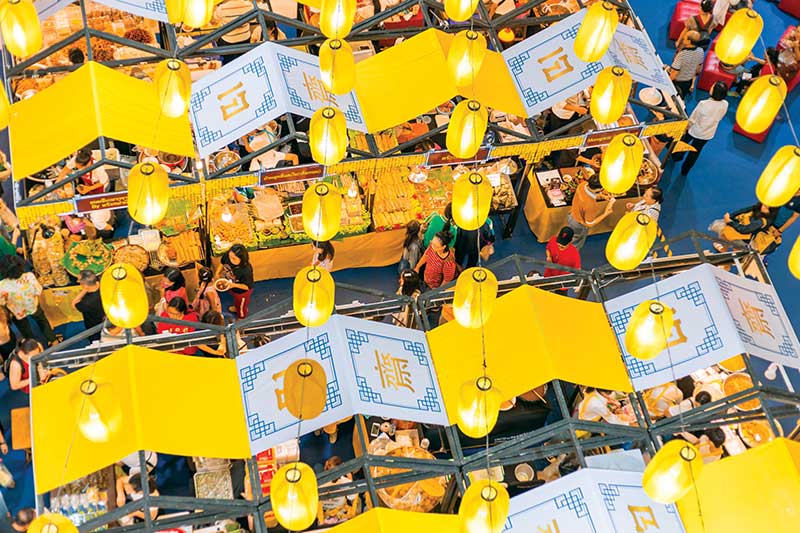
Pure Pleasure: A Guide to Thailand’s Vegetarian Festival
From Bangkok’s vegan banquets to Phuket’s fire-walkers, the country sizzles every October with nine nights of food, faith and tradition
Words Pinanong Panchuen
Photos Pinanong Panchuen & Shutterstock
Each October, as the ninth lunar month arrives, Bangkok’s Chinatown turns into a sea of yellow. Flags flutter from shophouses, market stalls brim with colourful vegetables and the scent of incense mingles with aromas of bubbling pots. The annual Vegetarian Festival, or Tesagan Gin Je, is more than a culinary spectacle – it’s a moment when Thai-Chinese communities reaffirm their identity, faith and compassion by abstaining from meat.
While Phuket may steal the headlines with its fire-walking devotees and gory rituals, Bangkok’s Yaowarat and Talat Noi neighbourhoods offer a more soulful experience. Here, centuries-old shrines hidden in narrow alleys come alive with quiet reverence. Humble vegan meals are prepared with care, families gather around long tables, and the community’s spirit glows gently under lantern light.
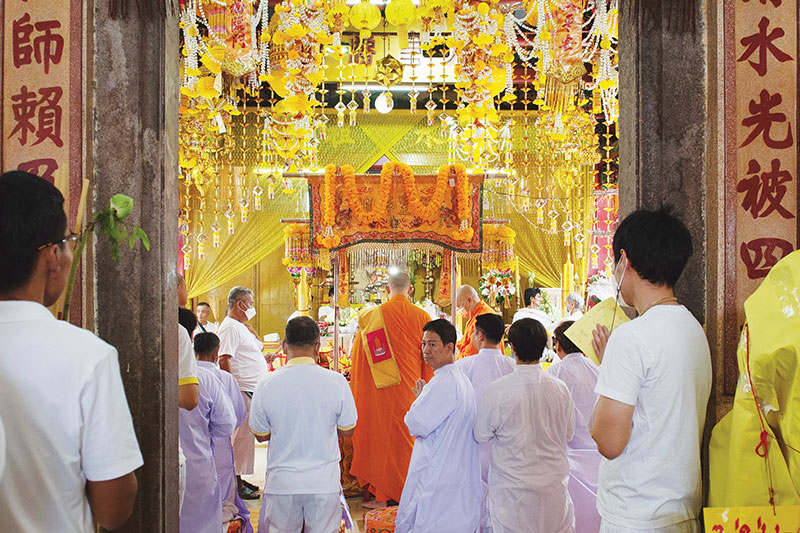
The Spirit of the Festival
The word Je comes from Chinese and reflects the Buddhist precepts of abstaining from killing or consuming animals. Yellow flags bearing the world “Je” in both Thai (เจ) and Chinese (斋) signal the festival’s arrival, spanning nine nights from the first day of the ninth lunar month. This year, it runs from October 21-29.
Panyaphat Lerdsamranroengrom, a scholar of Chinese culture, traces the festival’s roots to the Teochew (Chaozhou) tradition, a Mahayana Buddhist belief honouring seven incarnations of the Buddha and two Bodhisattvas – enlightened beings who vow to help others reach enlightenment. During this time, devotees recite prayers, follow the Buddhist precepts and avoid meat, animal products and five pungent ingredients thought to inflame the senses: garlic, Chinese chives and tobacco.
In southern provinces like Chumphon, Songkhla, Trang and Phuket, the festival takes on a theatrical flair shaped by Hokkien Taoist customs – with fire-walking, spirit possession and grand processions – but the core principles of abstinence and purification remain unchanged.
Practicing “Je” is both a spiritual act and an ethical commitment that nourishes body and mind. As an old Chinese proverb says: “One vegetarian meal can save 10,000 lives”.
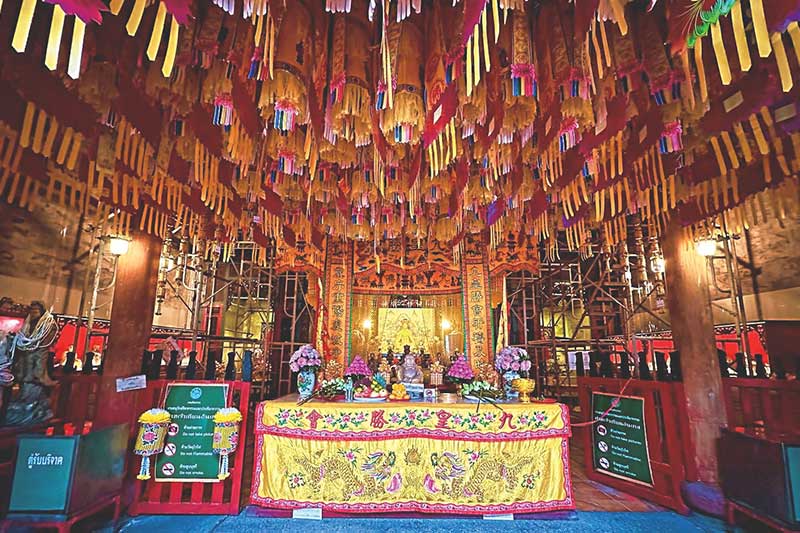
Yaowarat: A Meditative Journey
Start your adventure at the Chinatown Gate on Yaowarat Road, where yellow banners herald the festival’s arrival. Both sides of the street are lined with stalls, with long queues and irresistible aromas. Look closer for red and gold signs advertising dishes like Pad Thai Je, fried taro, or “duck” in herbal gravy. Many of these family eateries operate only during the festival, serving treasured recipes passed down through generations.
Step deeper into the alleys and the bustle gives way to the soft murmur of prayers. Hidden shrines glow with flickering joss sticks while volunteers ladle daikon soup into metal bowls. In some, a nun may serve you stir-fried morning glory – humble, deeply nourishing and free of MSG.”
At the temple, everybody eats from the same pot. “Whether you are a CEO or a street vendor, it’s a lesson in humility. In the eyes of the divine, we are all equal,” Panyaphat adds.
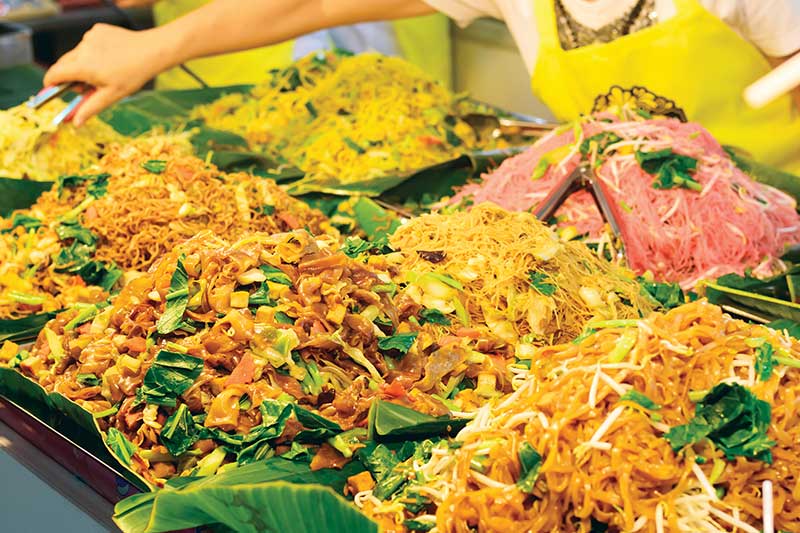
Talat Noi: Modest Yet Magnificent
Nearby in Talat Noi, the festival is anchored by the two-century-old Chow Sue Kong Shrine, Bangkok’s largest Hokkien temple. Though rooted in vibrant Hokkien beliefs, the rituals here lean towards serenity, focusing on inner purity under the watchful gaze of the gods. The food scene in Talat Noi is legendary. Streets overflow with stalls offering rare vegan delights: sweet Chinese noodle’s from Uncle Chua’s 60-year-old shop, Toobtub peanut candy pounded by a mallet, taro-stuffed waffles and warm pandan custard from Heng Seng – a shop better known for ceremonial pillows than desserts.
Also tempting are vegan fishcakes, stir-fried noodles and mock shark fin soup – if you’re patient enough to wait in the long queues of loyal customers. All this unfolds against a backdrop of Chinese opera and lion dances, adding drama to this mindful banquet.
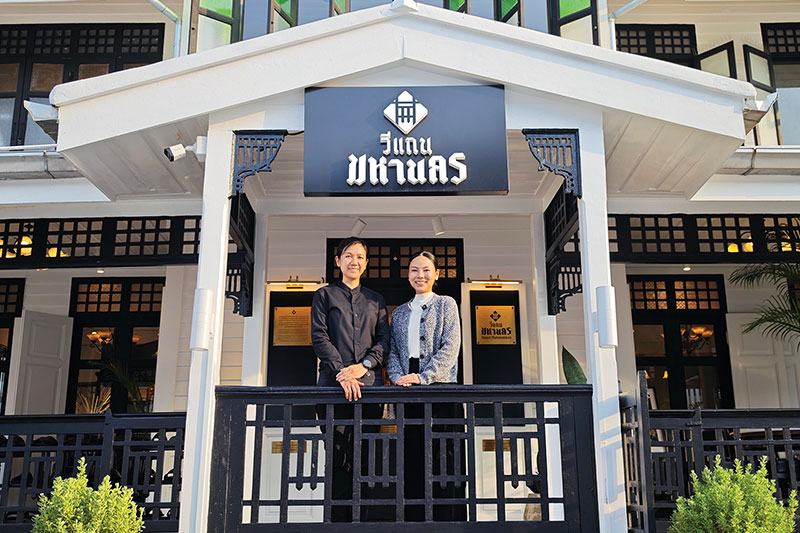
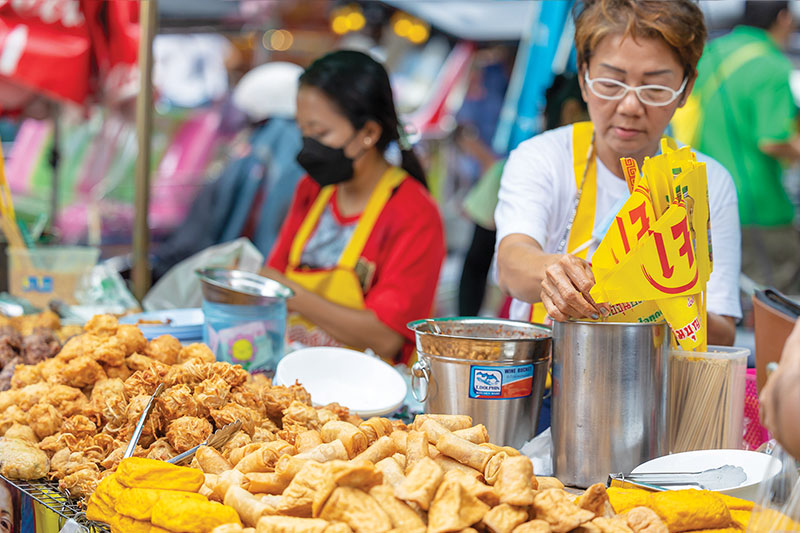
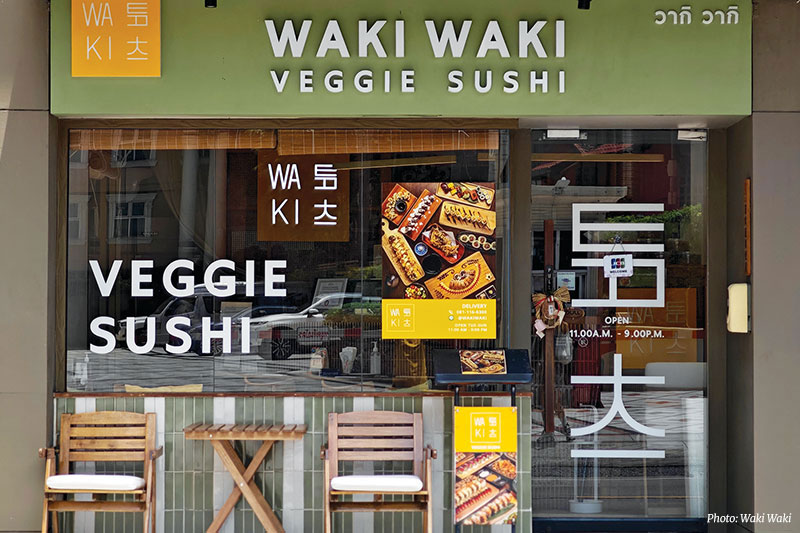
After the Nine Days
For those inspired to continue their plant-based journey, Bangkok offers plenty of year-round Je dining.
By the Leng Hong Gold Shop near the corner of Yaowarat Road, Je Kamlai’s cart has been frying golden vegan morsels for over two decades. Her corn fritters, fried daikon and sweet potato balls are crisp, comforting and delightfully affordable.
Tucked off Yaowarat Soi 8, Je Lee’s alleyway restaurant draws Thai and foreign regulars with bowls of vegan Yen Ta Fo, spicy vegan tom yam noodles, stir-fried acacia tofu and southern-style rice fried with chilli paste. With dishes under 70 baht, it’s a true taste of homegrown devotion.
Over on Song Wat Road – named one of the “World’s Coolest Neighbourhoods” by Time Out – Agar Raga blends tradition with a minimalist twist. Think mock shark fin soup made with seaweed-based jelly noodles, paired with fruit-studded agar desserts on shaved ice. Each gorgeously presented dish is also vegan, gluten-free and climate conscious.
In leafy Pinklao, Vegan Mahanakorn transforms royal Thai cuisine into modern vegan masterpieces in a wooden house once owned by Thailand’s first female sculptor, Kaimook Chuto. Innovative twists on tradition include neem flower salad, vegan laab, and red curry with straw mushrooms, alongside desserts like bergamot sorbet and flower-shaped cashew cakes.
Prefer to eat downtown? Head to Waki Waki in Sukhumvit 24, where new sushi creations are crafted from vegetables – think torched eggplant nigiri, kobocha pumpkin, and basil-seed “caviar” gunkan.
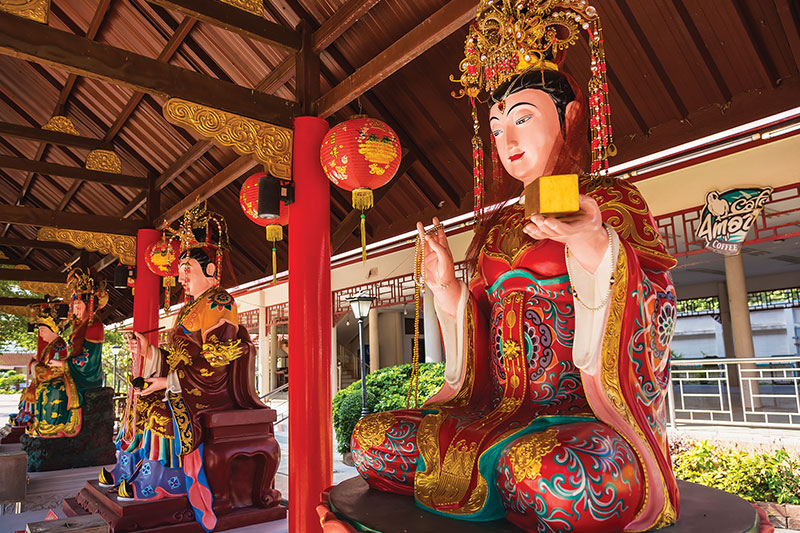
Echoes Across the Kingdom
The festival’s yellow flags are raised in nearly every corner of Thailand, each region adding its own spin on the culinary drama.
Now officially recognised as Intangible Cultural Heritage by Thailand’s Ministry of Culture, in Phuket, the Nine Emperor Gods Festival brings a gory twist to the Je spirit. Devotee in trance-like states walk on fire, climb ladders of knives and pierce their cheeks with everything from daggers to bicycle wheels – all to channel divine spirits and atone for suffering.
Though raw and dramatic, these acts are considered sacred rather than sensational.
The culinary offerings are equally vivid: stir-fried Hokkien noodles glisten with soy glaze, while Malaysian-style otak-otak – spicy, coconut tofu “fishcakes” – sit steaming alongside cooling scoops of coconut sorbet on butterfly pea sticky rice.
In Nakhon Sawan, the festival takes on a sacred tone. Statues of Guanyin, the goddess of compassion, are carried through the streets in processions of chanting devotees, transforming the city into a floating celestial vision.
Suphan Buri celebrates with a quieter grace. Here, Chinese temples become sanctuaries for meditation as white-clad devotees light candles, chant sutras and serve bowls of rice porridge to visitors.
In Hat Yai, near Malaysia and Singapore, the festival turns into a vibrant, cross-cultural feast. Hundreds of vendors transform streets into open-air kitchens of sizzling vegan satay, bubbling mock meat curries, and rainbow desserts glistening under the glow of lanterns. Celebrity chefs host live cooking demonstrations, showcasing both traditional Chinese fare and Southern specialities.
Across the regions, from Suphan Buri’s whispered chants to Phuket’s thundering drums, the festival speaks one truth: compassion is universal.
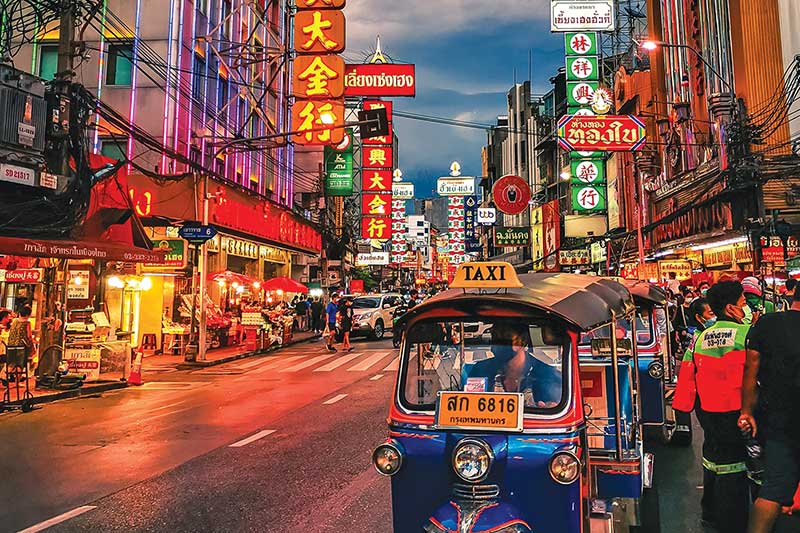
The Power of Restraint
Ultimately, the Vegetarian Festival is not about giving up pleasures, but about finding meaning within. It invites us to pause and consider what we consume, not just on our plates, but with our hearts and minds.
In Bangkok’s Yaowarat and Talat Noi neighbourhoods, where Thai-Chinese families have lived for generations, the festival remains a quiet triumph of community. Beneath the yellow flags and steam-filled stalls, a deeper story unfolds – one of conscience, care and shared grace.
Even after the lanterns and banners come down, the spirit lingers – in the memory of a perfect stir-fry, the warmth of a shared bowl, and the echo of a prayer carried on the breeze.
